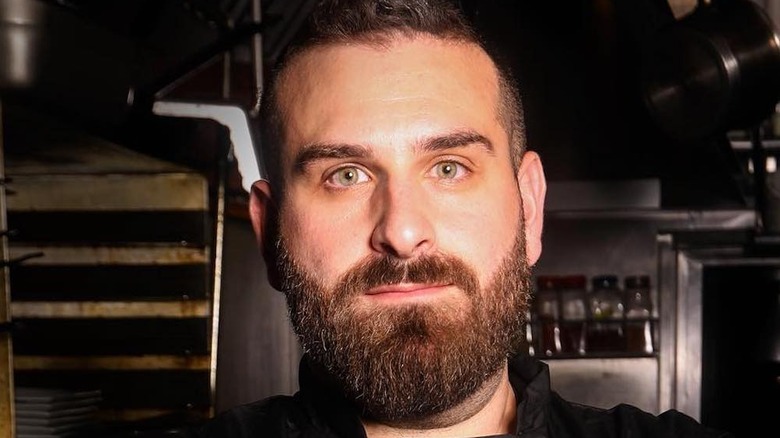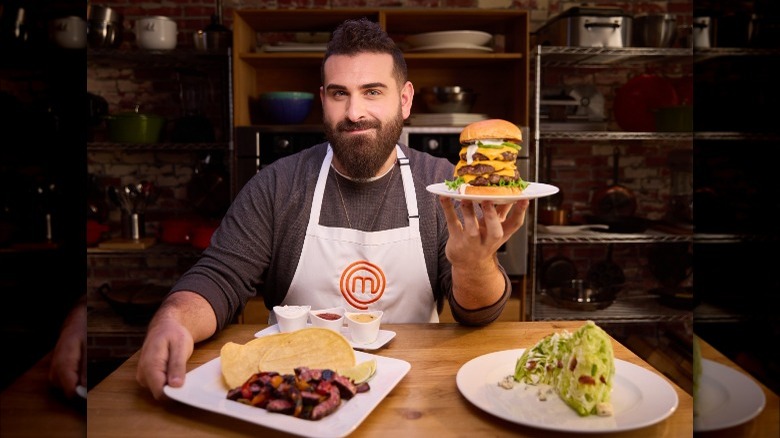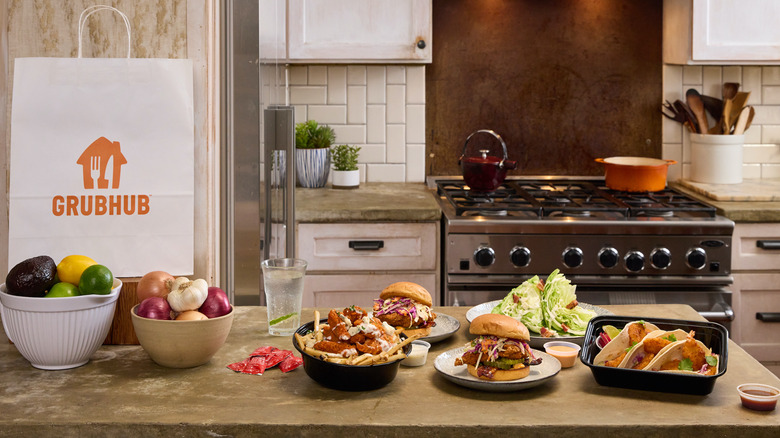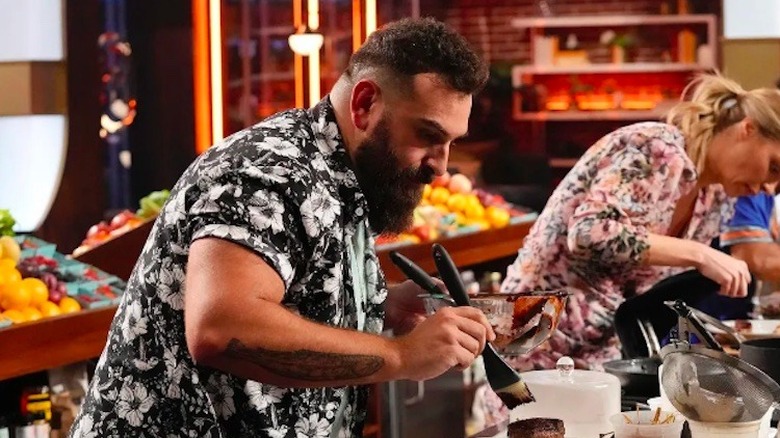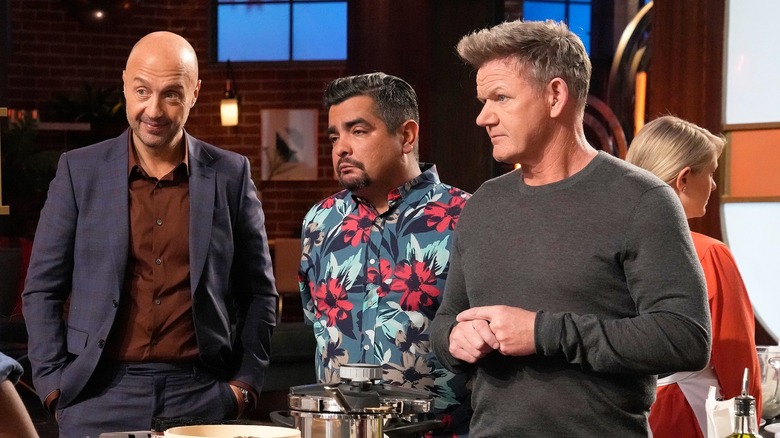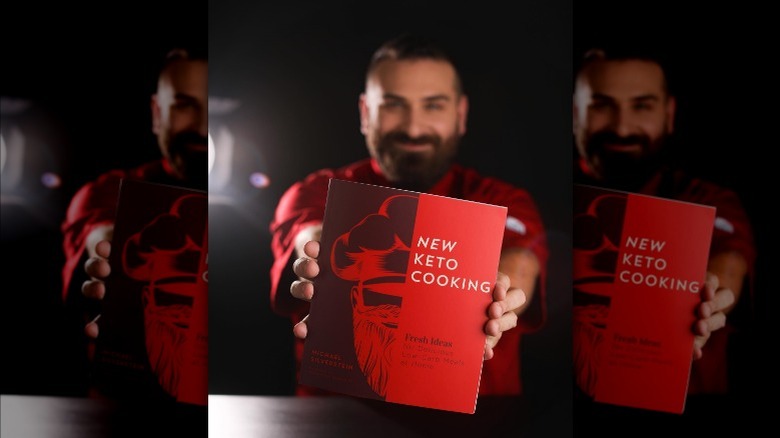Michael Silverstein Discusses MasterChef Table And His Return To The Show - Exclusive Interview
If you've ever watched a cooking show like "MasterChef" and wistfully salivated over the mouthwatering dishes the contestants put forth (under intense time limits and mounting pressure, we might add), then you're probably not alone. Now, "MasterChef" is looking to make your tastebuds' dreams come true, teaming up with Grubhub to bring MasterChef Table to hungry fans around the country. Working with local restaurants in select cities around the country, several "MasterChef" winners and fan favorites are serving up competition-worthy dishes that you can order online and get delivered right to your own kitchen table.
One of those chefs is Michael Silverstein, who you may remember from Season 10. Silverstein may have been among the first to go when he competed on "MasterChef," but that didn't stop him from winning our hearts along the way. He's back for Season 12 of "MasterChef: Back to Win" with a new strategy for success and a renewed determination to make it all the way to the end. While we don't know how the season will pan out, in the meantime, fans can get a taste of what the chef, known for his keto-focused recipes, is cooking up in the MasterChef kitchen, with a few simple clicks on Grubhub.
In an exclusive interview with Mashed, Silverstein dished on the big, bold flavors he created for the MasterChef Table menu and opened up about returning to the "MasterChef" kitchen. He also shared exactly what he thinks we all need to know about keto cooking.
Try Chef Michael Silverstein's bold Texas flavors with MasterChef Table on Grubhub
Talk a little bit about the dishes that you created for the MasterChef Table menu.
I'm so excited, because I feel like when we see someone on TV on a cooking show, there's no way to take that food home. This is the first time that, as somebody who's cooked on TV, that people can taste my food, and that's really exciting for me.
I created a menu that's really a taste of home for me, here in Texas. I brought a lot of the big, bold Texas flavors to everyone's table. We've got these really beautiful Texas-style fajitas covered in queso. It's next level delicious.
My triple-stack smash burger ... I'm calling it the Chef Michael burger. It's stacked up and layered with a zesty jalapeno ranch that's got a little bit of a kick, and some avocado. A little bit of healthy, a little bit of nutrition, and that creaminess adds so much to the burger. I also love the opportunity for people to try things their way. We could do the lettuce wrap or the bun on that burger.
To lighten it up, a big, crispy, delicious blue cheese wedge salad, which is one of my favorite things. It's unapologetically big and bold and overloaded with bacon and scallions and all this goodness. [It's] really a kickass menu with big flavors.
When you were approached to do this, did you know, right off the bat, what you wanted to make, or did it take some time for you to kind of figure out exactly how you were going to express yourself through this menu?
Especially as a cookbook author, I try to think all the time about, "What do people need, what do people want at home?" Whether they're cooking, whether they're ordering delivery, I try to get in the minds of everybody. What do we want?
It ultimately comes back to what I want. If I'm coming home from a long day at work, what do I want to eat? That's really as simple as the conversation was to myself. What would I order? What would I really want for dinner and bring to my table? That's the food I made, some of my personal favorite dishes: fajitas, a good burger, and a really delicious salad. That's a perfect meal for me. It was actually pretty easy for me to find a menu because I made the food that I love.
MasterChef Table embraces the restaurant industry of the future
As someone who has said that they have dreams of opening a restaurant one day, what are your thoughts on the new dining concepts emerging these days, like these virtual kitchens and collabs like MasterChef Table?
Looking back on the last two-three years especially, the food industry has been turned upside down. For better or for worse, the world is changing. We live in a digital world. We have more people at home working than ever before, and the idea of what a restaurant looks like is changing. Fast casual and takeout [have] a very new meaning than they once did, and delivery as well. Historically, delivery ... wasn't taken as seriously, but this concept really brings light to the fact that this is a new era, and it's really important that everybody has access to amazing food at any budget, in any location, all around the country.
When you look at a concept like the MasterChef Table, you realize that this is one of the first times that people can get their hands on chef quality, "MasterChef"-worthy cuisine without leaving their couch.
It's crazy, to be honest, but it's the new world, and I'm embracing it. As a chef, I have shifted my work out of the restaurant industry, and I'm in my home writing recipes all the time. That's opened my eyes to how much I can connect with people around the country through recipes, through food, and now, physically through the MasterChef Table without leaving my own kitchen. It's made me rethink the entire restaurant industry and the food space in general, but it's amazing, and it's the future.
Chef Michael dishes on his return for redemption on MasterChef
How does it feel to be competing again on "MasterChef"?
That's a big question ... I never saw myself walking back into the "MasterChef" kitchen again, [nevermind] returning to compete against the best of the best that have ever been there. Frankly, I was not one of the highest ranked members of even my own season. I got 15th place on my season. Here I am walking into the kitchen, fighting against runners up, fourth, fifth, sixth place people who've gone on to some really amazing culinary careers as restaurateurs, food truck owners, caterers. And then there's me, who, at times, battles with my own journey, my own imposter syndrome. Here I am in [one of] the toughest culinary competitions in the world that's only gotten more challenging.
And at the same time, it's thrilling. It's also terrifying. Anytime you cook for Gordon Ramsay, you know the pressure's on. You know there is no room for error, and this season, it was only more intense. It was only more stressful, and only more exciting. I felt this was my chance for redemption. This was my shot to prove that I am much better than 15th place.
That's what I'm here to prove. So I'm going to set out and do that. I got my apron. I'm ready to show that I am one of the toughest competitors in that kitchen, and I humbly believe that I'm one of the best chefs that's walked in through those double doors, and I'm going to show it this season.
Talk a little bit about that moment that you were selected to come back. I know you posted about it on Instagram. You said a lot happened that night. How did it feel to have Gordon Ramsey call your dish finale worthy in the first episode?
Beyond a state of total shock, it was very deeply fulfilling and inspiring, to be honest. I've had a couple years since leaving the "MasterChef" kitchen on Season 10 to think about what happened and to understand where I land as a chef in this industry. I came back with a vengeance. I came back ready to fight, and my apron battle showed that. I don't think anybody expected me, the underdog in the room, to create one of the better audition dishes out of all 40 battles. It really proved to the viewers, but more so than anything, to myself, that I have what it takes to be a master chef.
Mastering the pressure of the MasterChef kitchen
What were the biggest lessons you learned the last time around, and how is that affecting your strategy for success this time?
I attribute my failure in Season 10, if that's what you would call it, to an inability to handle the pressure of the "MasterChef" kitchen. I'm confident in my culinary skills, but there's something different. You can be an amazing chef and not survive the "MasterChef" kitchen, because of the pressure, because of Gordon Ramsay screaming in your face. We've got these extremely tough judges, not to mention cameras, some of the best competitors in the country fighting around you, and time limits that are insane.
"MasterChef" is not just about who's the best cook, but who's the best cook under pressure — under pressure that far surpasses anything that you find in any other environment. That's what I learned out of Season 10, to manage my emotion, take control of that stress and turn it into power, turn it into strength, instead of fear or nerves. I came back even more honed in on my culinary school skills after the last three years of cooking, but also ready to ignore the noise around me and cook — not worry about the pressure, not worry about the stress, not worry about the noise, the cameras, the lights, but come in there and do what I do best, which is cook. That's what I did.
What Chef Michael Silverstein wants you to know about keto cooking
As a verified expert, what are some of your best keto cooking tips that you can share with our readers?
The most important thing to remember about keto — or really, anytime you want to make positive changes around your health and your eating — is to keep it simple. You don't need fancy ingredients or complicated processes and additives and stuff to make something delicious. In fact, the line between what makes something keto and not is much thinner than most people expect.
I really think about keto as getting rid of some of the wheat, the flour, the sugar, but you can still eat the food you love. That's what my books are about. They're not diet-y. They're not overly restrictive and health driven. They do that, but the most important thing is that every recipe in my book is delicious food, the food that anybody would want to eat, whether you're keto or not. That's the key.
A lot of people get focused on the rules when they're dieting, counting carbs, counting calories, and they get so caught up in the rules that they forget to eat real food, delicious food. The thing I like to say is that the only thing you're doing wrong is eating food you don't love.
What are some of the biggest misconceptions about eating keto and keto cooking that you want to set the record straight on?
Keto gets a bad rep. It needs a better PR team. People see a lot of information on the web about keto being very dangerous, very high in fat, very high in sodium, but the truth is that there's so much science that has proven that a lot of the trouble that we have with our health these days is related to an over consumption of sugar and wheat and gluten.
It is really important to understand that any diet can be dangerous if you overdo it, and keto is included in that. I like to say, if you're eating bacon-wrapped mayo, you're not doing keto right. If you're eating a beautiful piece of fish with some broccolini on the side, or a nice steak with some beautiful salad or slaw, or a wedge salad ... it's using really good ingredients, really healthy proteins and meats, along with a little bit of that nice natural fat that you might get from avocado.
A lot of the misconception comes around the way that people perceive keto and its general culture of being this fat-filled, overly saturated dietary restriction, when the truth is it's meat and greens. It's the way human beings have been eating for thousands of years.
Catch new episodes of "MasterChef" Season 12 every Wednesday on Fox.
